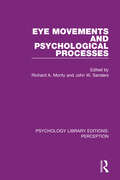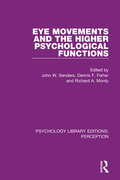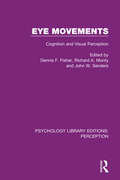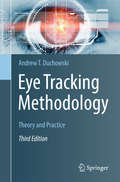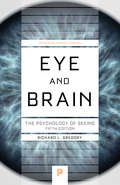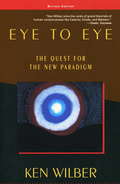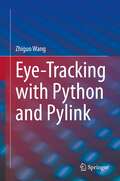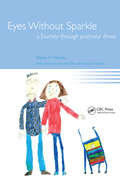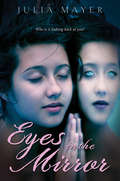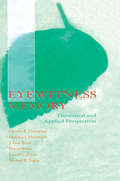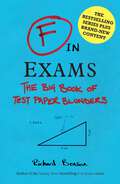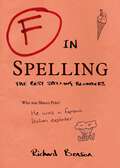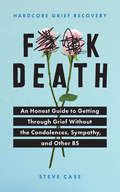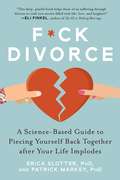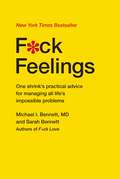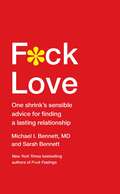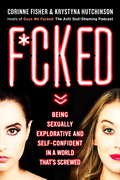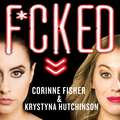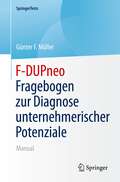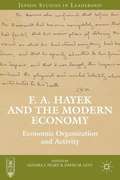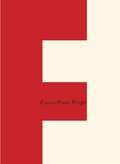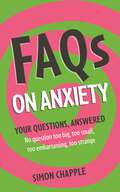- Table View
- List View
Eye Movements and Psychological Processes (Psychology Library Editions: Perception #22)
by Richard A. Monty and John W. SendersIn the 10 years prior to publication the quantity of research on eye movements as they pertain to psychological processes had been increasing at a rapid rate. Originally published in 1976, the editors’ purpose was to bring together investigators representing different theoretical positions and methodological approaches to present their recent findings, to debate the theoretical points of view, and to identify and discuss the major research problems on eye movements at the time. An attempt was made to invite participants ranging all the way from promising graduate students through the established authorities in the field. The result was an intensive three-day session with meetings from early morning until late into the evening with much opportunity for formal and informal group discussion. The edited papers and transcripts of the discussions are the contents of this book.
Eye Movements and the Higher Psychological Functions (Psychology Library Editions: Perception #26)
by John W. Senders, Dennis F. Fisher and Richard A. MontyOriginally published in 1978, this volume reflects the proceedings of a conference held in February 1977 in California and is a natural successor to the earlier volume Eye Movements and Psychological Processes (Monty & Senders, 1976). The second conference was aimed at providing a greater opportunity for discussing the "higher mental processes" touched on in the first volume. Part 1 is devoted to an intensive review of the underlying processes and psychological functions of eye movements. It includes discussions of the relationships of cortical and subcortical visual areas to eye movements and visual processing associated with them; information about the position of the eye in the head and the perception of visual space; saccades and visual functioning; and masking. In further parts it goes on to look at: methodology and models; cognitive processes; reading processes; looking at static and dynamic display; and finally chapters on problems and applications.
Eye Movements: Cognition and Visual Perception (Psychology Library Editions: Perception #8)
by John W. Senders Dennis F. Fisher Richard A. MontyOriginally published in 1981, this volume represents the edited proceedings of the third symposium on eye movements and behaviour sponsored by the US Army Human Engineering Laboratory. The conference, titled "The Last Whole Earth Eye Movement Conference" was held in Florida in February 1980. As the conference approached, seizure of the American hostages by the Iranian militants, the Russian invasion of Afghanistan, and the uncertain economic outlook around the world made it appear as though the title was a self-fulfilling prophecy. But the meeting proved highly successful and people throughout the world seemed to be adapting to the stresses of international tension, making the possibility of subsequent meetings more likely. The present volume is intended to serve as a complementary text to the earlier texts Eye Movements and Psychological Processes (Monty & Senders, 1976) and Eye Movements and the Higher Psychological Functions (Senders, Fisher & Monty, 1978), rather than a revision and update of them.
Eye Tracking Methodology
by Andrew T. DuchowskiDespite the availability of cheap, fast, accurate and usable eye trackers, there is little information available on how to develop, implement and use these systems. This book aims to fill that gap in the market by providing an accessible introduction for practitioners and students. The first part of the book covers useful background information, including an introduction to the human visual system and key issues in visual perception and eye movement. The second part surveys eye-tracking devices and gives a detailed introduction to the technical requirements for installing a system and developing an application program. It focuses on video-based, corneal-reflection eye trackers - the most widely available and affordable type of system. The final part looks at a number of interesting and challenging applications in areas such as Human Factors, Collaborative Systems, Virtual Reality, Marketing and Advertising. Eye Tracking Methodology: Theory and Practice will be an invaluable guide for practitioners responsible for developing or implementing an eye tracking system. It will also be an invaluable teaching text for relevant modules on advanced undergraduate and postgraduate courses such
Eye and Brain: The Psychology of Seeing
by R. L. GregoryWe are so familiar with seeing, that it takes a leap of imagination to realise that there are problems to be solved. But consider it. We are given tiny distorted upside-down images in the eyes, and we see separate solid objects in surrounding space. From the patterns of stimulation on the retinas we perceive the world of objects, and this is nothing short of a miracle.
Eye and Brain: The Psychology of Seeing
by Richard L. GregorySince the publication of the first edition in 1966, Eye and Brain has established itself worldwide as an essential introduction to the basic phenomena of visual perception. Richard Gregory offers clear explanations of how we see brightness, movement, color, and objects, and he explores the phenomena of visual illusions to establish principles about how perception normally works and why it sometimes fails. Illusion continues to be a major theme in the book, which provides a comprehensive classification system. There are also sections on what babies see and how they learn to see, on motion perception, the relationship between vision and consciousness, and on the impact of new brain imaging techniques. sentation of the text and illustrations has been improved by the larger format and new page design. The thousands of readers of the previous editions of Eye and Brain will find this new revised edition even more attractive and enthralling.
Eye and Brain: The Psychology of Seeing (Fifth edition)
by Richard L. GregorySince the publication of the first edition in 1966, Eye and Brain has established itself worldwide as an essential introduction to the basic phenomena of visual perception. In this book, Gregory offers clear explanations of how we see brightness, movement, color, and objects, and he explores the phenomena of visual illusions to establish principles about how perception normally works and why it sometimes fails. Although successive editions have incorporated new discoveries and ideas, this is the first time that Richard Gregory has completely revised and updated the text, adding more than thirty new illustrations. The phenomena of illusion continue to be a major theme in the book, in which the author makes a new attempt to provide a comprehensive classification system. There are also new sections on what babies see and how they learn to see, on motion perception, and tantalizing glimpses of the relationship between vision and consciousness and of the impact of new brain imaging techniques. In addition, the presentation of the text and illustrations has been improved by the larger format and new page design. The thousands of readers of the previous editions of Eye and Brain will find this new revised edition even more attractive and enthralling.
Eye to Eye: The Quest for the New Paradigm
by Ken WilberIn this book Wilber presents a model of consciousness that encompasses empirical, psychological, and spiritual modes of understanding. Wilber examines three realms of knowledge: the empirical realm of the senses, the rational realm of the mind, and the contemplative realm of the spirit. Eye to Eye points the way to a broader, more inclusive understanding of ourselves and the universe.
Eye-Tracking with Python and Pylink
by Zhiguo WangSeveral Python programming books feature tools designed for experimental psychologists. What sets this book apart is its focus on eye-tracking.Eye-tracking is a widely used research technique in psychology and neuroscience labs. Research grade eye-trackers are typically faster, more accurate, and of course, more expensive than the ones seen in consumer goods or usability labs. Not surprisingly, a successful eye-tracking study usually requires sophisticated computer programming. Easy syntax and flexibility make Python a perfect choice for this task, especially for psychology researchers with little or no computer programming experience.This book offers detailed coverage of the Pylink library, a Python interface for the gold standard EyeLink ® eye-trackers, with many step-by-step example scripts. This book is a useful reference for eye-tracking researchers, but you can also use it as a textbook for graduate-level programming courses.
Eyes Without Sparkle: A Journey Through Postnatal Illness
by Elaine HanzakOne day you will feel better… Eyes without Sparkle is a powerful medical autobiography describing the journey followed by the author into, through, and out of puerperal psychosis, the most severe form of postnatal depression. With vivid and intimate descriptions of events and the author’s feelings, this is the only book offering a single first-hand account of postnatal illness. The book serves as an inspiration for anyone suffering from or involved with a depressive illness. For health and social care professionals it is a reflective guide to learning from patients’ experiences, and the examples of positive and negative aspects of treatment can inform mental health services and policies.
Eyes in the Mirror
by Julia MayerEvery teen girl fantasizes about having a double and best friend rolled into one-an alter ego with whom she can trade places, allowing her to disappear. Samara is a troubled and lonely adolescent, prone to cutting, who desperately craves both intimacy and escape from her unfulfilled life...until she meets her reflection, Dee, the seeming answer to all her problems. With dual and dueling points of view, Eyes in the Mirror provides a perspective on one girl's life never before seen in YA fiction: her own and from her freer, wilder reflection.
Eyewitness Memory: Theoretical and Applied Perspectives
by Douglas J. Herrmann Michael P. Toglia J. Don Read David G. Payne Charles P. Thompson Darryl BruceThe organization of the first Society for Applied Research in Memory and Cognition (SARMAC) conference centered around two specifically identifiable research topics -- autobiographical memory and eyewitness memory. These two areas -- long-time staples on the menu of investigators of memory in more natural settings -- differ on a variety of dimensions, perhaps most notably on their specific goals for scientific inquiry and application. For many questions about memory and cognition that are of interest to scientific psychology, there have been historical as well as rather arbitrary reasons for their assignment to the autobiographical or eyewitness memory fields. Perhaps as a result of differing historical orientations, the first volume's seven autobiographical memory chapters focus upon the qualities or types of recall from research participants, whereas the seven chapters in the eyewitness memory volume generally focus upon the quantity (a concern for completeness) and accuracy of recall. This interest in the ultimate end-product and its application within the legal process in general encourages eyewitness memory investigators to modify their testing procedures continually in an attempt to gain even more information from participants about an event. Indeed, several of the eyewitness memory chapters reflect such attempts. Beyond the specific contributions of each chapter to the literature on autobiographical and eyewitness memory, the editors hope that the reader will come away with some general observations: * the autobiographical and eyewitness memory fields are thriving; * these two fields are likely to remain center stage in the further investigation of memory in natural contexts; * although the autobiographical and eyewitness memory chapters have been segregated in these two volumes, the separation is often more arbitrary than real and connections between the two areas abound; * the two research traditions are entirely mindful of fundamental laboratory methods, research, and theory -- sometimes drawing their research inspirations from that quarter; and * the two fields -- though driven largely by everyday memory concerns -- can contribute to a more basic understanding of memory at both an empirical and a theoretical level.
F in Exams: The Big Book of Test Paper Blunders
by Richard BensonBursting with head-scratching exam answers, this collection brings together the most side-splitting examples from the F in Exams series.
F in Spelling: The Funniest Test Paper Blunders (F In Exams Ser.)
by Richard BensonWe all know that the written word is full of traps for the unwary, and this goes double for those in their early years of learning it. Enjoy this collection of side-splitting spelling slip-ups ranging from the charming to the ridiculous, and the cute to the unintentionally X-rated!
F**k Death: An Honest Guide to Getting through Grief without the Condolences, Sympathy, and Other BS
by Steve CaseGrief recovery that'll never say "it all happens for a reason"When you lose a loved one, you're going to feel like sh*t. Plain and simple. And healing through your grief can be the start of a very difficult journey, especially when every other book on loss is quietly patting you on the head, telling you everything will be okay. But, guess what: We know everything is not okay. And we're here to actually help.This is straight to the point, honest-as-h*ll grief recovery. Paring away the cloying sympathy and the pitying hugs, F**k Death stands at your side through the five stages of grief, giving you a shoulder to lean on and a friend to yell "f**k this." This book will be honest about all this sh*t:Denial: manage the impulse to say "this can't be f*cking happening" with mindfulness and groundingAnger: how to be an **shole without ruining your whole life and how to release your anger when it has served its purposeBargaining: advice for ditching the "what ifs," reframing your situation, and reclaiming your agencyDepression: tips for when absolutely everything feels like sh*t and a variety of strategies for expressing your painAcceptance: how embracing the suckage allows you to move on feels in a world that might feel completely differentCovering each moment of your grief journey and asking the tough questions along the way, this is the grief book that will ultimately pick you up, dust you off, and help you heal.
F*ck Divorce: A Science-Based Guide to Piecing Yourself Back Together after Your Life Implodes
by Erica Slotter Patrick MarkeyA Divorcee&’s Empirical (and Slightly Irreverent) &“What&’s Next&” Guide to Life after Marriage Just about everything about divorce sucks. It sucks away your time, your money, and occasionally your will to live. We know. We&’ve been there. We&’ve both been divorced and are now remarried . . . to each other.F*ck Divorce is not a book about divorcing (which stinks); it is a book about putting the pieces back together afterward (which doesn&’t have to). Using the latest scientific research, a bit of tough love, and a highly questionable sense of humor, psychologists and relationship scientists Erica Slotter, PhD, and Patrick Markey, PhD, will teach you how to navigate your post-divorce relationships with yourself, kids, and even your slug-breath ex-spouse. They&’ll hold your hand as you navigate the complicated, exciting, and sometimes terrifying world of dating and sex as a born-again singleton and be by your side as you (hopefully) find your way to new love. Learn:Self-Care in the Post-Divorce HazeHow to Rediscover the Newly Single YouThe Importance of Being Nice(ish) to Your ExHow to Help Your Kids Through the Sh*tstormHow to Survive the Awkwardness of First Dates . . . AgainNavigating Your Newfound Sexy TimeDivorce-Proofing: Keeping Marriage 2.0, or 3.0, Together So, welcome to the world of being newly unwed. It&’s good, bad, and ridiculous, and sometimes your blind date smells like soup. Pull up a chair, pour yourself a drink (or three), and let&’s do this sh*t.
F*ck Feelings: One Shrink's Practical Advice for Managing All Life's Impossible Problems
by Sarah Bennett Michael Bennett, MDNew York Times Bestseller The only self-help book you&’ll ever need, from a psychiatrist and his comedy writer daughter, who will help you put aside your unrealistic wishes, stop trying to change things you can&’t change, and do the best with what you can control—the first steps to managing all of life&’s impossible problems.Here is the cut-to-the-chase therapy session you’ve been looking for! Need to stop screwing up? Want to become a more positive person? Do you work with an ass? Think you can rescue an addicted person? Looking for closure after abuse? Have you realized that your parent is an asshole? Feel compelled to clear your name? Hope to salvage a lost love? Want to get a lover to commit? Plagued by a bully? Afraid of ruining your kid? Ready to vent your anger? In this brilliantly sensible and funny book, a Harvard-educated shrink and his comedy-writing daughter reveal that the real f-words in life are “feelings” and “fairness.” While most self-help books are about your feelings and fulfilling your wildest dreams, F*ck Feelings will show you how to find a new kind of freedom by getting your head out of your ass and yourself onto the right path toward realistic goals and feasible results. F*ck Feelings is the last self-help book you will ever need!
F*ck Love: One Shrink's Sensible Advice for Finding a Lasting Relationship
by Sarah Bennett Michael Bennett, MDFrom the brilliant New York Times bestselling authors of the &“refreshingly blunt&” (Harper&’s Bazaar) F*ck Feelings—this seriously irreverent roadmap reveals the essentials to look for when you're done being suckered by the promise of true love and want help seeking a real, lasting relationship.Many people have opinions on the subject of romantic relationships—why they’re so hard to find, so difficult to maintain, so easily analogized to planets and pets—but the real source of trouble isn’t too complicated: it’s that we are choosing our partners based on love, excitement, lust, attraction, neediness…on feelings. Instead of helping readers find true love (also known as “total bullshit”), Dr. Michael Bennett and his comedy-writing daughter Sarah reveal the practical, commonsense criteria for good partnerships that will allow real love to develop, even after the romance has died down or been buried completely. Finding a good partner involves losing preconceived notions about who your dream date might be, so the Bennetts helpfully appraise the pros and cons of eight traits people most commonly seek: charisma, beauty, chemistry, communication, sense of humor, family stability, intelligence, and wealth. They suggest you’ll have better luck finding a partner in a bar, online, or on a date arranged by your chiropractor if you focus on ideas like mutual attraction and respect and common interests and common goals. With helpful quizzes, case studies inspired by Dr. Bennett’s practice, and unscientific flow charts, F*ck Love is packed with enough advice and wisdom to help you avoid the relationship nightmares that led you to this book in the first place.
F*cked: Being Sexually Explorative and Self-Confident in a World That's Screwed
by Krystyna Hutchinson Corinne FisherAn Uncensored Conversation About Sex and Self from the Creators of the Top-Rated Guys We F*cked: The Anti Slut-Shaming Podcast'They are the voices of a new generation of women for whom no sexual encounter is off limits' Times MagazineComedians Corinne Fisher and Krystyna Hutchinson started Guys We F*cked: The Anti Slut-Shaming Podcast in 2013, intending to interview guys they'd slept with to learn more about themselves and squash the stigma so often associated with sexual women. As the podcast grew, and Corinne and Krystyna got to know their fans, stories of sexual assault, verbal and emotional abuse and crippling shame became common topics of discussion along with those humorous conversations highlighting overall sexual confusion among many adults. The podcast is now a community of over a million listeners worldwide and a place where any and all taboo sex topics are discussed freely, both with celebrity guests and the real people in their lives.F*cked follows that model, as Corinne and Krystyna bring a mix of raw, ridiculous and serious sexual conversation to the page that will include topics like:· Why shame is completely made up and how we can stop giving into it· Sexual exploration and how it sometimes ends in a trip to A&E· Stuff we should stop doing: Snooping, nitpicking our bodies, and faking orgasms· Asking your sexual partner uncomfortable questions· How to get yourself out of an unsafe situation· Masturbation, threesomes, porn, sex toys, butt stuff and much, much moreThis is a guide to love and sex for anyone who has ever felt afraid to be their authentic sexual self. It won't talk down to you or coddle you, because you're better than that. Despite what Rom-Coms and glossy magazines tell you, you can handle sexual exploration without the assistance of a man, a glass of rosé, or a Xanax-and more importantly, you're fine all by yourself.
F*cked: Being Sexually Explorative and Self-Confident in a World That's Screwed
by Krystyna Hutchinson Corinne FisherAn Uncensored Conversation About Sex and Self from the Creators of the Top-Rated Guys We F*cked: The Anti Slut-Shaming PodcastComedians Corinne Fisher and Krystyna Hutchinson started Guys We F*cked: The Anti Slut-Shaming Podcast in 2013, intending to interview guys they'd slept with to learn more about themselves and squash the stigma so often associated with sexual women. As the podcast grew, and Corinne and Krystyna got to know their fans, stories of sexual assault, verbal and emotional abuse and crippling shame became common topics of discussion along with those humorous conversations highlighting overall sexual confusion among many adults. The podcast is now a community of over a million listeners worldwide and a place where any and all taboo sex topics are discussed freely, both with celebrity guests and the real people in their lives.F*cked follows that model, as Corinne and Krystyna bring a mix of raw, ridiculous and serious sexual conversation to the page that will include topics like:· Why shame is completely made up and how we can stop giving into it· Sexual exploration and how it sometimes ends in a trip to A&E· Stuff we should stop doing: Snooping, nitpicking our bodies, and faking orgasms· Asking your sexual partner uncomfortable questions· How to get yourself out of an unsafe situation· Masturbation, threesomes, porn, sex toys, butt stuff and much, much moreThis is a guide to love and sex for anyone who has ever felt afraid to be their authentic sexual self. It won't talk down to you or coddle you, because you're better than that. Despite what Rom-Coms and glossy magazines tell you, you can handle sexual exploration without the assistance of a man, a glass of rosé, or a Xanax-and more importantly, you're fine all by yourself.
F-DUPneo - Fragebogen zur Diagnose unternehmerischer Potenziale: Manual (SpringerTests)
by Günter F. MüllerF‐DUPNeoDie Langform des F‐DUPNeo besteht aus zwölf Subtests und 108 Items. Sie ermöglicht eine breite und umfassende Diagnose unternehmerischer Eigenschaftspotenziale. Das Profil von Testwerten einzelner Eigenschaften lässt individuelle Stärken und Schwächen erkennen. Zudem kann aus den Messwerten der sechs differenzierungsfähigsten Subtests die Größe des unternehmerischen Gesamtpotenzials er‐mittelt werden. Wenn es Gründe gibt, die Diagnose unternehmerischer Potenziale zu ökonomisieren, kann eine Kurzform des F‐DUPNeo eingesetzt werden. Sie besteht aus sechs Subtests und hat halb so viele Items wie die Langform. Die betreffenden Subtests zeichnen sich dadurch aus, dass sie besonders gut zwischen selbstständig und an‐gestellt tätigen Personen differenzieren. Auch decken sie das Spektrum motivationaler, affektiver, kognitiver und soziale Eigenschaftspotenziale ab.
F. A. Hayek And The Modern Economy
by Sandra J. Peart David M. LevyWhat is the role of human agency in Friedrich Hayek's thought? This volume situates Hayek's writing as it relates to economic organization and activity, particularly to assess what role Hayek assigns to leaders in determining economic progress.
F: Poems
by Franz WrightIn these riveting poems, Wright declares, "I've said all that / I had to say. / In writing. / I signed my name. / It's death's move." As he considers his mortality, the poet finds a new elation and clarity on the page, handing over for our examination the flawed yet kneeling-in-gratitude self he has become. F stands both for Franz, the poet-speaker who represents all of us on our baffling lifelong journeys, and for the alphabet, the utility and sometimes brutality of our symbols. (It may be, he jokes grimly, his "grade in life.") From "Entries of the Cell," the long central poem that details the loneliness of the single soul, to short narrative prose poems and traditional lyrics, Wright revels in the compensatory power of language, observing the daytime headlights following a hearse, or the wind, "blessing one by one the unlighted buds of the backbent peach tree's unnoted return." He is at his best in this beautiful and startling collection.ent peach tree's unnoticed return." He is at his best in this beautiful and startling collection. From the Hardcover edition.
FAQs on Anxiety
by Simon ChappleYou left the doctor's surgery before you could ask the things you really wanted to know. You've googled your question about anxiety and had 75 answers, all contradicting each other.You asked your best friend - but they looked at you strangely.You have so many questions, but no idea where to start finding the answers. Here they are. In this book you'll find the definitive, expert responses to all your FAQs: On Anxiety. No question is too simple, too embarrassing, too rude or too offbeat to be included, and each one has been asked by thousands of people just like you.Can anxiety make you vomit?Will I lose my job because of anxiety?Are anxious people weak?All these questions, and hundreds more, are covered in this short but powerful, helpful, practical guide to managing your anxiety. Read at your leisure, or dip in and out when you most need the support or to shine a light on the thoughts and feelings that are making you uncomfortable or unhappy, and to bring them out of the shadows so you can understand and accept them.
FAQs on Anxiety
by Simon ChappleYou left the doctor's surgery before you could ask the things you really wanted to know. You've googled your question about anxiety and had 75 answers, all contradicting each other.You asked your best friend - but they looked at you strangely.You have so many questions, but no idea where to start finding the answers. Here they are. In this book you'll find the definitive, expert responses to all your FAQs: On Anxiety. No question is too simple, too embarrassing, too rude or too offbeat to be included, and each one has been asked by thousands of people just like you.Can anxiety make you vomit?Will I lose my job because of anxiety?Are anxious people weak?All these questions, and hundreds more, are covered in this short but powerful, helpful, practical guide to managing your anxiety. Read at your leisure, or dip in and out when you most need the support or to shine a light on the thoughts and feelings that are making you uncomfortable or unhappy, and to bring them out of the shadows so you can understand and accept them.
